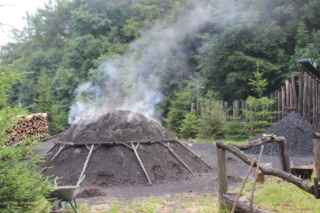How To Make Charcoal - Survival Manual

Method 1: One way to make your own charcoal is as follows. Get a container to hold the wood. The container can be anything as long as it is ALMOST airtight and is resistant to fire damage. A 55 gallon metal drum (208 liters) is an excellent choice but not the only choice. Now chop the wood into 4-inch pieces (10cm) and let it dry out before filling the container with the wood. A good hardwood such as oak or hickory is desired. Remember you do not want to use wet or green wood.
After filling the container with the cured wood seal up the container, however, you must not completely seal the container. This is because although you want an oxygen free environment for the wood you also need the air in the container to have the ability to release air or draw in air as the pressure changes during the process. Any fire inside the container will very quickly use up all the oxygen and give you the oxygen free atmosphere needed to make charcoal.
Light a fire around your container. Let it burn for at least 4 hours. Stay clear of the container because it could explode if the container becomes air tight at any point in the process. Now let the fire completely burn out and cool down before approaching.
When you open the container you'll see a fresh batch of pure lump charcoal. Test it by lighting a piece of it with a small flame. It shouldn't take much flame if the batch turned out well. Congrats on your first batch of charcoal.

The next step is to arrange dry branches that are very small, and can even have the dead leaves still on, against the outside of your firewood stack. These sticks and leaves will serve as a foundation for the dirt mud walls. Once you have lain enough small branches on the outside make mud... Yep, make mud pies and cover the outside of the stack of firewood with mud. The outer small branches will serve as a lattice work to hold the thick mud and not allow it to simply fall and run up into the fire wood.
Cover the entire stack with mud except for a smallish opening at the very top. This top opening should be about 6 inches (15cm) in diameter and result in what looks very much like a volcano.
Light a fire and drop it into the top opening of the volcano. Keep dropping in small twigs until you have your volcano roaring with fire. Quite an impressive site!
Now once the fire is really raging, take more mud and seal up the air holes in the bottom of the volcano. And then seal up the top as well!
The fire will be smothered out but it will have built up a lot of heat and the wood will continue to break down for a long time. It is important that the volcano is completely sealed so that no new air can enter into the middle of your volcano.
Let the volcano cool completely down and then break it open by pulling away the hardened mud walls to expose the charcoal that is inside! Congratulations you should have many pounds of charcoal ready for use!
Back to Gunpowder
Back to Fire



